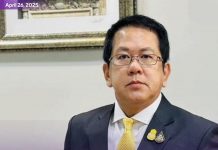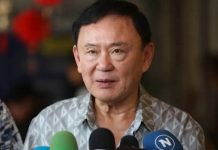With a majority vote of 296-3, Pheu Thai number one party-list MP Yingluck Shinawatra was bestowed the title of the 28th Prime Minister of Thailand by the House of Representatives on 5 August 2011. Despite being a new face in politics, she has leapfrogged to the country’s top post past several of her seniors.
Ms Yingluck was born on 21 June 1967 as the youngest of ten offspring of Mr Lert and Ms Yindi Shinawatra. Among her elder siblings are self-exiled former Prime Minister Thaksin Shinawatra and Ms Yaowapa Wongsawat, wife of former Prime Minister Somchai Wongsawat.
Ms Yingluck is in a common-law marriage with Mr Anusorn Amornchat, Executive Director of M-Link Asia Corporation Plc and former Executive of the Charoen Pokphand (CP) Group. They have one son, named Supasek Amornchat.

Born and raised in Chiang Mai province, she received her lower secondary education at Regina Coeli College and higher secondary education at Yupparaj College. She graduated from Chiang Mai University in 1988 with a bachelor’s degree in Political Science and Public Administration before earning her master’s degree in Management Information Systems from Kentucky State University two years afterwards.
Career-wise, Ms Yingluck started out as an intern in the sales and marketing department of Shinawatra Directories Co, Ltd and soon advanced to become the director of procurement and the director of operations. Her official break into the telecommunication business was in 2002 when she assumed the posts of Chief Executive Officer (CEO) and Deputy Executive Director of Marketing of Advanced Info Service (AIS) Plc under her family’s conglomerate, Shin Corporation. She subsequently took the helm of the company as President before suspending her role as a businesswoman in 2011 in order to enter politics.
After the House of Representatives was dissolved on 10 May 2011 marking the end of the Democrat Party-led government of Mr Abhisit Vejjajiva, the Pheu Thai Party resolved on 16 May to appoint Ms Yingluck as the number one party-list candidate for the approaching 3 July general election. Pheu Thai’s electoral campaigns were then organized in grandeur across the Kingdom with the assistance of the United Front of Democracy Against Dictatorship (UDD). The party received an outpour of support from residents of the northern and northeastern regions, especially people at the grassroots level.
On the day of the polling, when the ballot boxes were closed and the counting process completed, the result suggested that Pheu Thai had claimed victory by a landslide over its opponent Democrat Party with 265 MP seats, which was more than half of the 500-seat parliament. As a consequence, Ms Yingluck automatically emerged as the frontrunner for the prime ministerial seat.
Her name was proposed during the first House session on 5 August as the only contender for the top position and she was elected with a vote of 296 in favor, 3 against and 197 abstained. His Majesty King Bhumibol Adulyadej granted his royal endorsement to Ms Yingluck as the 28th Prime Minister of Thailand on 8 August.
However, as the first female leader of the country with limited experience in politics, Ms Yingluck is now faced with several challenges, ranging from the public perception of her as merely a puppet of her brother Thaksin and the lawsuit over her alleged perjury stemming from the Shin Corp share case to how she will implement all of her expensive projects advertised during the campaign and cope with the stronger-than-ever opposition side in Parliament.




